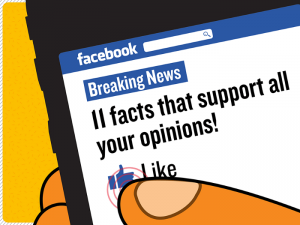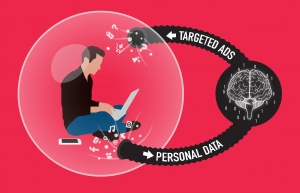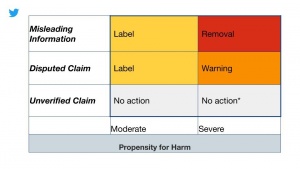Difference between revisions of "Echo Chambers"
(Improve clarity) |
m |
||
| Line 15: | Line 15: | ||
===Echo Chambers in Politics=== | ===Echo Chambers in Politics=== | ||
| − | Rush Limbaugh | + | Echo chambers are often spoken about with regards to political issues due to the highly obvious grouping often connected to political parties. One example of this is Rush Limbaugh, a conservative radio host, whose radio show was categorized as an echo chamber.<ref>Jamieson, K. H., & Cappella, J. N. (2010). Echo Chamber Rush Limbaugh and the Conservative Media Establishment. Oxford: Oxford University Press, USA.</ref> In a review done by the ''New York Times'', his radio show was described as being aimed at conservatives in the “silent majority” and reinforced theories against Democrats, framing them as “evil-doers, [with] the media [as] their evil allies.”<ref>Barbaro, M. (Host). (2021, February 22). The Legacy of Rush Limbaugh [Audio podcast]. Retrieved from https://www.nytimes.com/2021/02/22/podcasts/the-daily/rush-limbaugh-conservatism-donald-trump.html?showTranscript=1.</ref> The radio show created an echo chamber for its listeners, being fed information that confirmed their biases. In the same review, the ''New York Times'' credits Donald Trump’s win and the success of his style of politics to Rush Limbaugh, showing the real-life implication of this echo chamber.<ref>Barbaro, M. (Host). (2021, February 22). The Legacy of Rush Limbaugh [Audio podcast]. Retrieved from https://www.nytimes.com/2021/02/22/podcasts/the-daily/rush-limbaugh-conservatism-donald-trump.html?showTranscript=1.</ref> |
===Echo Chambers in Medicine=== | ===Echo Chambers in Medicine=== | ||
Revision as of 18:51, 23 March 2021

An Echo Chamber in technology and media is characterized by an environment in which one encounters only opinions and beliefs similar to their own, hears outside opinions, but chooses not to consider them or actively dismisses them.[2] Those who participate in echo chambers are often unintentionally experiencing confirmation bias. This bias occurs when people believe an idea to be true, and only view evidence that confirms their beliefs. When they encounter information that presents a rebuttal, they cast doubts on it.[3] Yet, people are also far less likely to question rumors about opposing viewpoints. [4] Echo chambers often occur on social media sites and can lead to political polarization and extremism.[5] As a result, people’s realities can be impacted, alternative perspectives can begin to be disbelieved, and real-life implications can occur.[6]
Contents
Similar Phrases
Echo chambers are often associated and confused with several other phrases. Two of those concepts are epistemic bubbles and filter bubbles. The difference between an epistemic bubble and an echo chamber, is that, in an epistemic bubble, insiders of the group are not exposed to alternative perspectives, unintentionally or not. While in an echo chamber, insiders are exposed to alternative perspectives, but distrust those outside sources.[7] Filter bubbles, on the other hand, do relate to echo chambers. This bubble is a state of isolation that can occur from personalized algorithms.[8] Echo chambers, however, refer to the overall concept of only being exposed to information from like-minded individuals, and filter bubbles can be a method for echo chambers to occur, but just refer to the results of algorithms.
Social Media

Social networking sites, like Facebook and Twitter, are often blamed and accused of being the biggest proponents of echo chambers, due to their personalization algorithms. Many people now get their news through these sites and these algorithms cater to one’s interests. This curation has led to what is known as a “filter bubble.”[10] These filter bubbles present news and information that the user wants to see. So if a user only subscribes to news from one side of the political spectrum, their newsfeeds will be primarily filled with this information. Facebook and Twitter are especially criticized because studies show higher segregation on these sites compared to sites like Reddit. This has been attributed to the fact that sites like Facebook and Twitter have feed algorithms that cannot be changed by the user, while sites like Reddit allow the user to choose what information they see.[11]
Furthermore, these sites have also been criticized for allowing users to form groups with users who share their views, leading to group polarization, which have had real-life effects, such as a decrease in the trust of vaccinations during the COVID-19 pandemic.[12][13]
Ethical Implications
Echo chambers, while mostly present in online communities, do have real-life effects and ethical implications. They can lead its members to distrust those on the outside of the chamber with different beliefs, even if those beliefs are true.[14] These chambers often have political and scientific consequences.
Echo Chambers in Politics
Echo chambers are often spoken about with regards to political issues due to the highly obvious grouping often connected to political parties. One example of this is Rush Limbaugh, a conservative radio host, whose radio show was categorized as an echo chamber.[15] In a review done by the New York Times, his radio show was described as being aimed at conservatives in the “silent majority” and reinforced theories against Democrats, framing them as “evil-doers, [with] the media [as] their evil allies.”[16] The radio show created an echo chamber for its listeners, being fed information that confirmed their biases. In the same review, the New York Times credits Donald Trump’s win and the success of his style of politics to Rush Limbaugh, showing the real-life implication of this echo chamber.[17]
Echo Chambers in Medicine
Echo chambers have also had real-life implications for the medical industry. In a 2017 study on 2.6 million Facebook users over 7 years, it was found that consumption of content about vaccinations was dominated by the echo chamber effect and increased polarization.[18] And as recently as the COVID-19 pandemic, anti-vaxxer groups on social media networks have influenced opinions on the safety of new vaccinations.[19] These groups often reinforce conspiracy theories on vaccinations and encourage their members to not vaccinate themselves or their families. Thye often do so via alleged stories about side effects from unverified sources, with their members being more moved by these stories than scientific data provided by health agencies.[20]
Prevention of Echo Chambers
Company driven prevention

Many companies, specifically social media networks, have been working to combat echo chambers. During the rise of COVID-19 and the 2020 Presidential Election, for example, Twitter began adding disclaimers on Tweets that may contain false information. These labels informed users whether a Tweet contained misleading information, disputed claims, or unverified claims.[21] Information that has been verified to be false by experts falls under the misleading information category. [21] Information that is contested or just unknown falls under the disputed claim category. [21] Finally, information that is unconfirmed, so it could be true or false, is labeled as unverified information. [21] Tweets with one of these labels appended to them will have links to Twitter’s curated page or with links to trusted third-party sources that have verified information. Tweets with a warning label will be blocked from viewing but can be viewed if the user acknowledges that the information may not be accurate. Additionally, the systems that are making tweets are not amplifying tweets with warnings or labels. [21] Twitter’s system for identifying tweets with misinformation is still in its early stages and leaders of this initiative at Twitter are open to adjusting labels and other metrics. In 2017, Facebook also made changes to their network’s “Trending” page by showing multiple news sources for a topic or event with the intent of providing users a variety of viewpoints.[22]
User driven prevention
Though most control resides within social media companies, the user is able to take some steps to prevent being in an echo chamber. [23] The algorithms that categorize users can only do this because they know what users like and do not like. Their whole goal is to increase your engagement. [24] Thus, to prevent the algorithm from classifying users, one method says to be conservative with your likes on social media. [25] Furthermore, users can be mindful of the amount of followers people they follow have. At USC, Professor Kristina Lerman’s research says that people who have a large disparity between followers and following have an outsized influence on social media.[25] Lastly, on social media apps like Facebook and Twitter, you can update how you want your feed to give you information. The default mode on your feed is set up to give you personalized content that you should in theory engage with better. Users now have the option to have information given in chronological order instead of a personalized order. [26] This way users will be given the most up-to-date information, not necessarily information that will reinforce the user’s current beliefs.
References
- ↑ Ostergren, M. (2018, February 1). [Political Cartoon of Echo Chambers]. Retrieved March 12, 2021, from https://medium.com/@maryostergren/why-we-must-resist-the-allure-of-political-echo-chambers-404ebf3aaa49
- ↑ Echo chamber. (n.d.). Retrieved March 12, 2021, from https://www.oxfordlearnersdictionaries.com/us/definition/english/echo-chamber
- ↑ Heshmat, S. (2015, April 23). What is confirmation bias? Retrieved March 12, 2021, from https://www.psychologytoday.com/us/blog/science-choice/201504/what-is-confirmation-bias
- ↑ Nicholas, DiFonzo. (2011, April 22). The Echo-Chamber Effect. Retrieved March 18, 2021, from https://www.nytimes.com/roomfordebate/2011/04/21/barack-obama-and-the-psychology-of-the-birther-myth/the-echo-chamber-effect
- ↑ Barberá, P., Jost, J. T., Nagler, J., Tucker, J. A., & Bonneau, R. (2015). Tweeting From Left to Right: Is Online Political Communication More Than an Echo Chamber? Psychological Science, 26(10), 1531–1542. https://doi.org/10.1177/0956797615594620
- ↑ How filter bubbles distort reality: Everything you need to know. (2019, November 14). Retrieved March 12, 2021, from https://fs.blog/2017/07/filter-bubbles/
- ↑ C. Thi Nguyen Associate Professor of Philosophy. (2021, February 17). The problem of living inside echo chambers. Retrieved March 12, 2021, from https://theconversation.com/the-problem-of-living-inside-echo-chambers-110486
- ↑ What is a filter Bubble? - definition from Techopedia. (n.d.). Retrieved March 12, 2021, from https://www.techopedia.com/definition/28556/filter-bubble
- ↑ (2017, February 14). [The feedback loop between users and advertising companies.]. Retrieved March 17, 2021, from https://www.sticky.digital/danger-of-living-in-a-filter-bubble/
- ↑ Hosanagar, K. (2016, November 25). Blame the echo chamber on Facebook. but blame yourself, too. Retrieved March 12, 2021, from https://www.wired.com/2016/11/facebook-echo-chamber/
- ↑ Cinelli, M., Morales, G. D., Galeazzi, A., Quattrociocchi, W., & Stanini, M. (2021). The echo chamber effect on social media. Proceedings of the National Academy of Sciences March 2021, 118(9). doi:10.1073/pnas.2023301118
- ↑ Ulen, Thomas S., Democracy and the Internet: Cass R. Sunstein, Republic.Com. Princeton, Nj. Princeton University Press. Pp. 224. 2001. Available at SSRN: https://ssrn.com/abstract=286293 or http://dx.doi.org/10.2139/ssrn.286293
- ↑ Burki, T. (2020). The online anti-vaccine movement in the age of covid-19. The Lancet Digital Health, 2(10). doi:10.1016/s2589-7500(20)30227-2
- ↑ C. Thi Nguyen Associate Professor of Philosophy. (2021, February 17). The problem of living inside echo chambers. Retrieved March 12, 2021, from https://theconversation.com/the-problem-of-living-inside-echo-chambers-110486
- ↑ Jamieson, K. H., & Cappella, J. N. (2010). Echo Chamber Rush Limbaugh and the Conservative Media Establishment. Oxford: Oxford University Press, USA.
- ↑ Barbaro, M. (Host). (2021, February 22). The Legacy of Rush Limbaugh [Audio podcast]. Retrieved from https://www.nytimes.com/2021/02/22/podcasts/the-daily/rush-limbaugh-conservatism-donald-trump.html?showTranscript=1.
- ↑ Barbaro, M. (Host). (2021, February 22). The Legacy of Rush Limbaugh [Audio podcast]. Retrieved from https://www.nytimes.com/2021/02/22/podcasts/the-daily/rush-limbaugh-conservatism-donald-trump.html?showTranscript=1.
- ↑ Schmidt AL, Zollo F, Scala A, Betsch C, Quattrociocchi W. Polarization of the vaccination debate on Facebook. Vaccine. 2018 Jun 14;36(25):3606-3612. doi: 10.1016/j.vaccine.2018.05.040. PMID: 29773322.
- ↑ Thompson, D. (2021, January 29). Anti-Vaxxers wage campaigns Against covid-19 shots. Retrieved March 12, 2021, from https://www.webmd.com/vaccines/covid-19-vaccine/news/20210129/anti-vaxxers-mounting-internet-campaigns-against-covid-19-shots
- ↑ Ortiz-Sánchez, E., Velando-Soriano, A., Pradas-Hernández, L., Vargas-Román, K., Gómez-Urquiza, J. L., Cañadas-De la Fuente, G. A., & Albendín-García, L. (2020). Analysis of the Anti-Vaccine Movement in Social Networks: A Systematic Review. International journal of environmental research and public health, 17(15), 5394. https://doi.org/10.3390/ijerph17155394
- ↑ 21.0 21.1 21.2 21.3 21.4 21.5 Roth, Y. (2020, May 11). Updating our approach to misleading information. Retrieved March 12, 2021, from https://blog.twitter.com/en_us/topics/product/2020/updating-our-approach-to-misleading-information.html
- ↑ Cathcart, W. (2019, November 07). Continuing our updates to trending. Retrieved March 12, 2021, from https://about.fb.com/news/2017/01/continuing-our-updates-to-trending/
- ↑ Michael, Cusumano (2021, January 15). Social Media Companies Should Self-Regulate. Now. Retrieved March 19, 2021, from https://hbr.org/2021/01/social-media-companies-should-self-regulate-now
- ↑ (2016, July 24). The Reason Your Feed Became An Echo Chamber — And What To Do About It. Retrieved March 12, 2021, from https://www.npr.org/sections/alltechconsidered/2016/07/24/486941582/the-reason-your-feed-became-an-echo-chamber-and-what-to-do-about-it
- ↑ 25.0 25.1 Christopher, Seneca(2020, September 17). How to Break Out of Your Social Media Echo Chamber. Retrieved March 18, 2021, from https://www.wired.com/story/facebook-twitter-echo-chamber-confirmation-bias/
- ↑ Natt, Garun. (2020, March 6). How to switch your Twitter feed to a chronological timeline. Retrieved March 18, 2021, from theverge.com/2020/3/6/21167920/twitter-chronological-feed-how-to-ios-android-app-timeline/